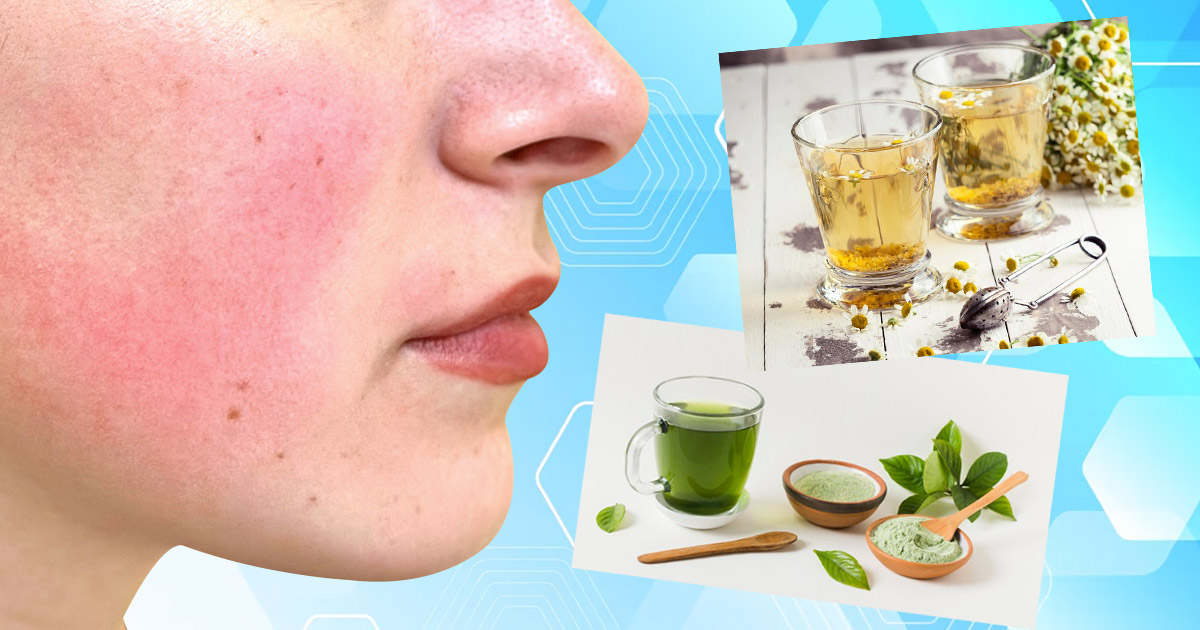7 Teas to Deal with Skin Rashes & Keep Skin Healthy

When your skin feels itchy or inflamed, your first instinct might be to grab a cream or ointment. But drinking the right tea could offer a gentle and natural way to help calm the irritation from within.
Let’s look at the types of tea to deal with itchy skin and improve overall skin health. These teas are known for their natural properties that support the body’s healing processes.
Understanding the Connection Between Tea and Skin
Before discussing the list, it helps to understand how tea supports the skin. Many herbal teas contain antioxidants, anti-inflammatory compounds, and nutrients that help reduce redness, calm irritation, and support detoxification. These benefits work together to help soothe common skin issues from the inside out.
1. Chamomile Tea: A Classic Soother
Chamomile tea is well-known for its calming properties. It also works wonders for skin inflammation. The plant contains oils and natural compounds that help reduce irritation and redness.
Chamomile has been found to penetrate deep layers of the skin, making it useful for conditions like eczema. Drinking chamomile tea may help ease itchy skin while promoting restful sleep, which also supports healing.
2. Green Tea: Gentle on the Skin, Packed with Power
Green tea contains polyphenols and antioxidants that help reduce inflammation and protect the skin. It’s one of the best teas for overall skin health.
If your rash comes with redness or irritation, green tea may help reduce those symptoms. Research has shown green tea can even protect the skin from sun damage and reduce oiliness, which is helpful for acne-prone skin too.
Its soothing properties also make it a strong option if you’re wondering what tea is good for itchy skin.
3. Licorice Root Tea: Sweet Relief for Redness
Licorice root tea tastes naturally sweet, but it’s more than just a treat. It contains glabridin, which helps lighten dark spots and soothe inflammation. This tea can also ease redness, making it useful for those with irritated or rash-prone skin.
Licorice root has been used in traditional medicine to treat eczema and other skin issues caused by inflammation. If your rash comes from stress or allergies, this tea may help your body calm down naturally.
4. Spearmint Tea: A Hormonal Helper
Sometimes, skin rashes are linked to hormone imbalances. This is common in conditions like PCOS or adult acne. Spearmint tea has anti-androgen effects, which means it can help lower excess male hormones in women.
In one study, women who drank spearmint tea experienced improvements in hormonal symptoms. As hormone levels balance, the skin may become less prone to breakouts or irritation. That’s why many consider spearmint a good tea for itchy skin, especially when hormones play a role.
5. Ginger Tea: Warming Relief for Inflammation
Ginger tea delivers a spicy, warming effect. It’s also packed with compounds that help reduce inflammation and protect the skin.
In a study involving ginger-infused creams, participants noticed an improvement in their skin’s appearance within a month. Drinking ginger tea may help the body fight inflammation and support overall skin repair. If your rash includes swelling or pain, this tea might offer soothing benefits.
6. Dandelion Root Tea: Nature’s Detoxifier
Dandelion root tea is often used to support liver health. When your liver is working well, toxins leave the body more effectively. That’s important because a buildup of toxins can lead to skin problems like rashes, eczema, or psoriasis.
This tea contains vitamins and minerals that support both liver function and skin health. Dandelion root is especially helpful for people with chronic skin conditions tied to poor detoxification.
If you’re searching for what tea is good for skin rash caused by internal imbalances, this tea deserves a spot in your routine.
7. Hibiscus Tea: Antioxidants with a Skin Boost
Hibiscus tea is vibrant, tart, and full of antioxidants. It’s great for overall skin health and may also help prevent skin damage from the sun.
Some studies show hibiscus extract helps maintain collagen and protect skin cells. This makes it a strong choice for supporting skin healing, especially when inflammation is present. Hibiscus tea may also help with uneven skin tone caused by rashes or scarring.
Let the Kettle Be Your First Step
Modern skincare often starts with serums and creams, but healing can begin with something as simple as what’s in your cup. The next time your skin feels uncomfortable, choose to slow down, boil some water, and turn that moment into a ritual of care. You’re not just making tea—you’re choosing to listen to your body in the most nurturing way.
